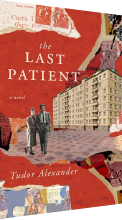Novels
Photos
Interviews & Reviews
The Last Patient
Synopsis
THE LAST PATIENT is a sweeping historical novel that captures one family’s struggle for love, survival, and identity under the grip of Communism in Romania. Spanning fifty years of political upheaval, this saga explores how ordinary lives are shaped—and sometimes shattered—by extraordinary times.
Kostea and Clara meet and fall in love shortly before World War II. As they get married, build careers, and raise a son, the world around them changes rapidly—and often violently. From the two-bedroom apartment they are “patriotically” forced to share with another family, to Bucharest’s rampant food shortages, Romania’s Cold War history plays out in their day-to-day lives.
Kostea, a charming yet domineering surgeon, craves control in a place where party loyalists hold the reins of power. His pursuit of respect and authority threatens his promising medical career and his relationships at home, risking Clara’s love. While the temptation to break through the Iron Curtain is omnipresent, THE LAST PATIENT is a poignant exploration of the eternal tension between personal aspirations and love.
To purchase this novel from Amazon, click here. To purchase from Barnes and Noble, click here. You can also shop local or get a copy that supports your favorite local bookstore by ordering through Bookshop.org.
Excerpt
“It gets worse by the day,” Kostea said.
“We’re small potatoes,” Clara said. “I don’t think they would touch us.”
“The Soviets are here to stay. I’m afraid they’ll touch everybody.” Kostea removed a strand of blond hair from his face and walked to the dark window. The bare bulb in the ceiling was spreading a dull, yellow light in the kitchen. Old furniture lay scattered everywhere. “Uncle Sebastian,” he said. “I just heard that they gave him twelve years.”
Clara shrugged.
“I practically grew up with the man,” Kostea continued, a melancholy smile on his face. “You know he’s Eugene’s uncle.”
“I don’t understand what he did that was so terrible.”
“Nothing,” Kostea said. “He buried twelve stupid gold coins in the backyard. Somebody saw him and informed the authorities. That person was being vigilant. Vigilant, get it? The new lexicon, the word of the day. Everything is a class struggle. The war ended five years ago, yet we’re still fighting. Uncle Sebastian tried to hide twelve coins of his prewar family fortune, and they gave him twelve years.”
“They are setting an example.”
“Poor man. Poor us. Poor everybody.” Kostea was on a roll, his eyes steely. “You’re right: we are small potatoes, but it doesn’t matter. What started at the top extends now to everybody. Simply put, it’s terror.”
“Kostea, don’t scare me. I’m tired.” Seated, Clara rested her head on the kitchen table and looked at her husband sideways. As she twisted, her belly protruded forward like an oversized melon. She was nine months pregnant, still worked, and had spent that entire day at Elias Hospital where both she and Kostea were employed as interns.
“Sure, you are,” Kostea said. He kneeled next to her, brought her hand to his lips, and kissed it. “Any time now, you might go into labor.”
“And the baby room isn’t ready.”
“I’ll take care of it. Don’t worry.”
Just then, there were loud knocks on the door, and male voices. Kostea jumped to his feet. “You say here.”
A man, a woman, and a child escorted by a policeman in uniform stood by the front door.
“Comrade Bardu, your apartment has been subdivided,” the policeman informed Kostea, handing him an authorization with the emblem of the precinct. “These are Comrades Sorin and Marta Ionescu, and their five-year-old son, Radu. Your second bedroom was assigned to them, with access to your kitchen and bathroom.”
Kostea paled. Haltingly, Clara had followed him, and he heard her breathing behind him. He turned and pointed at her rounded belly. “There must be a mistake. We need the space. We’re expecting a baby.”
The policeman shrugged. “I’m merely executing an order. You know there is an acute housing shortage after the war. All of us make sacrifices.”
For a few seconds the Ionescus stayed silent. Then Sorin Ionescu asked to inspect the premises. He led with a heavy step, Marta, Radu, and the policeman trailing. “We’ll be here tomorrow with a truck full of furniture,” he announced with a sweeping arm gesture. “And we expect our room to be empty.”
“We need you to make space in the bathroom and kitchen,” added Marta Ionescu.
In the days that followed, the Ionescus became noisier and more assertive. A few times Kostea was on the verge of confronting them, Clara managing each time to calm him down and preserve a precarious balance. During the day, Sorin went to work, as did Kostea and Clara. Marta stayed home with little Radu. Sorin proudly informed Kostea that he was a communist activist at a major Bucharest manufacturing shop called Red Grivița.
Everything in the new communist world was red. Everything.
*
Clara shook Kostea and told him that her water had broken. Sweat formed on his forehead. The doctor in him took over, and he brought towels and helped her get dressed. The Demetriades, in the apartment two levels above, had a phone. It was four in the morning, so Kostea knocked hard on their door. The chances of getting a cab or an ambulance were practically nonexistent, and he called Professor Dinescu, who sent over his government-issue Pobeda sedan and his driver. Both Clara and Kostea had been his students in medical school, and he had kept in touch with them, with an eye toward influencing their future careers. Weeks earlier, he had told Kostea, “When Clara’s labor begins, don’t hesitate. Day or night, call me.”
That was the type of man the professor was—helpful and calculating.
As Clara waddled down the front steps into the dark street, holding on to the handrail with one hand and Kostea’s arm with the other, the Ionescus showed up in the doorway.
“You made such a ruckus I feared the Americans had landed,” Marta yelled at them, her robe half unbuttoned. “Don’t you know our baby is sleeping?”
Kostea’s first impulse was to tell her to shove it, but he was too preoccupied with Clara and ignored her.
Despite the early hour, the car ride to Elias Hospital took a full twenty minutes. As the contractions came and went, Clara panted and moaned, her tearful green eyes filled with fear. Her dark-brown hair was disheveled, and beads of perspiration ran down her forehead. She squeezed Kostea’s hand.
At the hospital, Clara’s obstetrician, Dr. Pop, determined they had a while longer to wait and assigned them a private room. The fact that they worked there assured them special treatment.
Propped up by pillows, Clara tried to breathe and relax. Her hair fanned over her shoulders, a few strands glued to her forehead. She rested her bare arms on her belly, and Kostea imagined their baby curled up inside, getting ready for the big journey.
“Kostea,” Clara said, “my mother doesn’t know I am here.”
Kostea nodded and went to the nurses’ station. It was a few minutes before six, and the night shift was ending. He saw a familiar face among the tired nurses getting ready to leave. “Good morning, Monica,” he said, sounding deliberately positive.
The nurse waved as she adjusted her overcoat.
“It’s happening,” Kostea said. “Clara’s in labor.”
“I know, and good luck to you both,” Monica said. She smiled. “I’m out of here till my next shift.”
“Listen. Could you do Clara a favor?”
“I’ll try. Anything for your beautiful wife, Dr. Bardu.”
“You live in the same neighborhood as Clara’s mother. Stop by her place and ask her to come here.”
Monica hesitated. Kostea took a large bill from his wallet and offered it to her.
“No,” Monica said, looking around at the other nurses, who didn’t seem to be paying attention.
“Yes,” Kostea said. “You’re here after a sleepless night and under no obligation to help us.”
“This is too much,” Monica said, reaching for the money.
“If you think it’s too much, I’ll ask you for something else. Go by my friend’s place two streets down from my mother-in-law’s and give him the same information. Tell him that if I can, I’ll see him later at the Garden.” Kostea went to the dispatch table and wrote the names and addresses on a piece of paper.
Monica nodded, placed the paper in her purse, and left the hospital.

